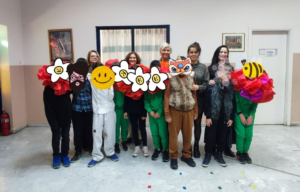PLAY- The Little Prince with a Green Twist
Το σχολείο μας υλοποιεί πρόγραμμα Erasmus+ KA122 από 15/09/2023 έως 14/2/2025
Τίτλος έργου: Ο Μικρός Πρίγκιπας – Ας φροντίσουμε το περιβάλλον που ζούμε!
Κωδικός έργου: 2023-1-EL01-KA122-SCH-000129363
Κατά την εβδομάδα κινητικότητας των εταίρων (11 -15 Μαρτίου) από Ιταλία, Λιθουανία και Ρουμανία στο σχολείο μας για την υλοποίηση του προγράμματος Erasmus+ KA122, οι μαθητές της Ε’ και Στ’ τάξης του Ολοήμερου σχολείου, κατέπληξαν με την θεατρική παράστασή τους “The Little Prince with a Green Twist”. Παρουσιάστηκε εξ ολοκλήρου στην Αγγλική γλώσσα. Οι φιλοξενούμενοι μαθητές και εκπαιδευτικοί ενθουσιάστηκαν, και οι μαθητές μας δεχθήκαν τα θερμά συγχαρητήρια από όλους!
Η προετοιμασία και καθοδήγηση έγινε από την εκπαιδευτικό Θεατρικής Αγωγής κ. Αθηνά Ευσταθίου. Τα κοστούμια δημιουργήθηκαν από την εκπαιδευτικό Εικαστικών κ. Μαρία Ανδρικοπούλου. Η διασκευή του θεατρικού έργου για τις ανάγκες του προγράμματος μας, έγινε από την εκπαιδευτικό Αγγλικής γλώσσας κ. Στεργιανή Αγιομαμίτου.
To Θεατρικό δημοσιεύτηκε από το Kindle Direct Publishing και πωλείται στο Amazon.com


